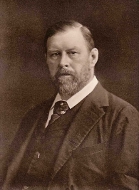Bram Stoker  Dracula
Dracula
 Bram Stoker was born on November 8, 1847, in a suburb of Dublin, Ireland, the third of seven children by Charlotte Mathilda Blake Thornley and Abraham Stoker, a civil servant. Though sickly as a child, Bram overcame his poor health and by 1864 was able to enter Trinity College in Dublin, where he studied mathematics and excelled in athletics. Elected president of the Philosophical Society, Stoker graduated with honors in 1870.
Bram Stoker was born on November 8, 1847, in a suburb of Dublin, Ireland, the third of seven children by Charlotte Mathilda Blake Thornley and Abraham Stoker, a civil servant. Though sickly as a child, Bram overcame his poor health and by 1864 was able to enter Trinity College in Dublin, where he studied mathematics and excelled in athletics. Elected president of the Philosophical Society, Stoker graduated with honors in 1870.
He took a job with the Civil Service, working in Dublin Castle, but his real love was the arts. He began writing theater reviews for the Dublin Evening Mail, soon becoming the Mail's drama critic. Stoker married actress Florence Balcombe in 1878, and the couple had a son, Irving Noel Thornley, in 1879. Soon after, he settled his family in London, where continued to write and socialize with many of the day's most famous actors, poets, and writers.
He worked on the literary staff of the London Telegraph and published several novels—including The Primrose Path (1875), The Snake's Pass (1890), and The Watter's Mou (1895)—and several short stories, collected in Under the Sunset (1881). It wasn't until the 1897 publication of Dracula, however, that Stoker achieved lasting success. Although not critically embraced at first, Dracula became a literary sensation, whose popularity only increased after the author's passing on April 20, 1912. The first full-length vampire novel, Dracula launched an entire category of fiction that would become one of the most beloved genres in literature, film, and television for over a century and counting.
Dracula overshadowed every other work Stoker produced, of course, but he continued to write and published the novel The Lair of the White Worm in 1911, which would later be adapted as a film (in 1988), and the posthumous short-story collection, Dracula's Guest and Other Weird Stories (1914), which included the eponymous story cut from the original manuscript of Dracula, and one of his best-known short stories, "The Judge's House."
